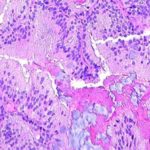1. Overall survival was significantly longer in patients taking darolutamide in tandem with androgen-deprivation therapy and docetaxel.
2. Frequency of adverse events in darolutamide and placebo groups was similar, with neutropenia being the most common grade 3 or 4 events.
Evidence Rating Level: 1 (Excellent)
Study Rundown: Past trials have shown that darolutamide (an androgen-receptor inhibitor), when used in tandem with androgen-deprivation therapy (ADT) and docetaxel has increased survival benefit in nonmetastatic, castration-resistant prostate cancer. This study explored the efficacy and safety of the same combination of drugs but in metastatic, hormone-sensitive prostate cancer patients. These patients were randomly assigned to receive ADT and chemotherapy, along with the addition of either darolutamide or a placebo. Overall survival was higher in the darolutamide group and the risk of death was lower. Patients in the darolutamide group were associated with higher benefits than the placebo group in the following secondary endpoints: time to development of castration-resistant disease, time to pain progression, symptomatic skeletal event-free survival, and time to initiation of subsequent systemic antineoplastic therapy. Adverse events of any grade occurred similarly in both groups. The frequency, severity and type of adverse events that occurred in the darolutamide group were not significantly different from established adverse events of ADT with docetaxel. Limitations to this study include generalizability to patients with poor performance status, as only those with low Eastern Cooperative Oncology Group performance scores were selected. The strength of this study is that it has limited bias given its design and shows a strong signal of overall survival with the addition of darolutamide to ADT and chemotherapy. Overall, this study demonstrated that the addition of darolutamide to ADT and chemotherapy is a suitable treatment option for patients with metastatic, hormone-sensitive prostate cancer.
Click to read the study in NEJM
Relevant Reading: Metastatic hormone-sensitive prostate cancer: a review of the current treatment landscape
In-Depth [randomized control trial]: This phase III international randomized control trial included 1305 patients with metastatic hormone-sensitive prostate cancer. Patients were randomly assigned in a 1:1 ratio to receive ADT and docetaxel, in addition to either darolutamide or placebo; 651 patients were in the darolutamide group and 654 in the placebo group. The overall survival in the darolutamide and placebo groups were 62.7% (95% confidence interval [CI], 58.7 to 66.7) and 50.4% (95% CI, 46.3 to 54.6), respectively. The risk of death was 32.5% lower in the darolutamide group (hazard ratio [HR], 0.68; 95% CI, 0.57 to 0.80; P<0.001). In the darolutamide group, the following secondary endpoints were longer than the placebo: time to development of castration-resistant disease (HR, 0.36; 95% CI, 0.30 to 0.42; P<0.001), time to pain progression (HR, 0.79; 95% CI, 0.66 to 0.95; P=0.01), symptomatic skeletal event-free survival (HR, 0.61; 95% CI, 0.52 to 0.72; P<0.001), time to first symptomatic skeletal event (HR, 0.71; 95% CI, 0.54 to 0.94; P = 0.02), and time to the initiation of subsequent systemic antineoplastic therapy (HR, 0.39; 95% CI, 0.33 to 0.46; P<0.001). Adverse events of any grade occurred similarly in both groups, with similar side effect profiles. Specifically, the incidence of grade 3 or 4 adverse events was 66.1% and 63.5% in the darolutamide and placebo groups respectively, with neutropenia being the most common one, with an incidence of 33.7% and 34.2%, respectively. Other common adverse events included alopecia (40.5% and 40.6% respectively), fatigue (33.1% and 32.9%, respectively) and anemia (27.8% and 25.1%, respectively). Overall, this study demonstrated that the darolutamide in combination with ADT and docetaxel improved overall survival with no increase in adverse events for patients with metastatic, hormone-sensitive prostate cancer.
Image: PD
©2022 2 Minute Medicine, Inc. All rights reserved. No works may be reproduced without expressed written consent from 2 Minute Medicine, Inc. Inquire about licensing here. No article should be construed as medical advice and is not intended as such by the authors or by 2 Minute Medicine, Inc.


